“There are so many ways of earning a living, and most of them are failures.
Wrote Gertrude Stein.”
(David Markson, The Last Novel, p. 87)
“There are so many ways of earning a living, and most of them are failures.
Wrote Gertrude Stein.”
(David Markson, The Last Novel, p. 87)
“WORK. — ‘I have no idea what the meaning of work is in our epoch, but I believe virtuosity is an infirmity, knowledge a dangerous asset, and I am well content to have some genius and no talent, which allows me not to work, and to play like a child: Work is an ostentatious thing, ugly and bogus as Justice.’ — K. Van Dongen”
(entry in the Encyclopædia Acephalica by Georges Bataille etc., p. 84 in the translation by Iain White.)
“Although this bit of figuring work need not be taken too literally, it quite adequately serves to show what technology has enabled us to do: namely, to reduce the amount of time actually spent on production in its most elementary sense to such a tiny percentage of total social time that it pales into insignificance, that it carries no real weight, let alone prestige. When you look at industrial society in this way, you cannot be surprised to find that prestige is carried by those who hep fill the other 96½ per cent of total social time, primarily the entertainers but also the executors of Parkinson’s Law. In fact, one might put the following proposition to students of sociology: “The prestige carried by people in modern industrial society varies in inverse proportion to their closeness to actual production.”
(E. F. Schumacher, Small Is Beautiful: Economics as if People Mattered, pp. 159–160)
“On my next visit to Kafka I inquired:
‘Do you still go to the carpenter in Karolinenthal?’
‘You know about that?’
‘My father told me.’
‘No, I have not been for a long time. My health does not permit it any more. His Majesty the Body.’
‘I can quite understand. Working in a dusty workshop is not very pleasant.’
‘There you are wrong. I love to work in workshops. The smell of wood shavings, the humming of saws, the hammer-blows, all enchanted me. The afternoon went so quickly I was always astonished when the evening came.’
‘You must certainly have been tired.’
‘Tired by happy. There is nothing more beautiful than some straightforward, concrete, generally useful trade. Apart from carpentry, I have also worked at farming and gardening. It was all much better and worth more than forced labour in the office. There one appears to be something superior, better; but it is only appearance. In reality one is lonelier and therefore unhappier. That is all. Intellectual labour tears a man out of human society. A craft, on the other hand, leads him towards men. What a pity I can no longer work in the workshop or in the garden.’
‘But you would not wish to give up your post?’
‘Why not? I have dreamed of going as a farm labourer or an artisan to Palestine.’
‘You would leave everything behind?’
‘Everything, if I could make a life that had meaning, stability, and beauty. Do you know the writer Paul Adler?’
‘I only know his book The Magic Flute.’
‘He is in Prague. With his wife and the children.’
‘What is his profession?’
‘He has none. He has no profession, only a vocation. He travels with his wife and the children from one friend to another. A free man, and a poet. In his presence I always have pangs of conscience, because I allow my life to be frittered away in an office.’
(Gustav Janouch, Conversations with Kafka, trans. Goronwy Rees, pp. 15–16)
“Vocation: that is no trade-school word for him. What is your name? Where are you from? What do you do? Among those who survey the habits of Americans, there are many who find these questions, which are likely to be among the first beckoning blanks we fill in on forms, and the first we put to strangers, indicative of our indifference to the essential self. Should men and women, after all, be defined in any important way by their work? The answer is, of course, yes; otherwise, the activities that largely support our lives and consume our time would be unfriendly, foreign, and irrelevant to us. Our occupation should not be something we visit like the seashore in summer or a prisoner in prison, despite the fact that the work may be unpleasant and dangerous and hard, like that in a mill or a foundry or a mine. Even if it is like speaking a foreign language we haven’t mastered, that incapacity itself is totally defining.”
(William Gass, “Open on the Sabbath”, in A Temple of Texts: essays, pp. 246–247)
I’ve never worked for a living. I consider working for a living slightly imbecilic from an economic point of view. I hope that some day we’ll be able to live without being obliged to work.
(Marcel Duchamp, interview with Pierre Cabanne, 1966)
In answer to your question – Fluxus way of life is 9 a.m. to 5 p.m. doing socially constructive and useful work – earning your own living, 5 p.m. to 10 p.m. spending time on propagandizing your way of life among other idle artists & art collectors and fighting them, 12 p.m. to 8 a.m. sleeping (8 hours is enough).
(George Maciunas, letter to Tomas Schmit, January 1964)
(being where I have worked in New York)
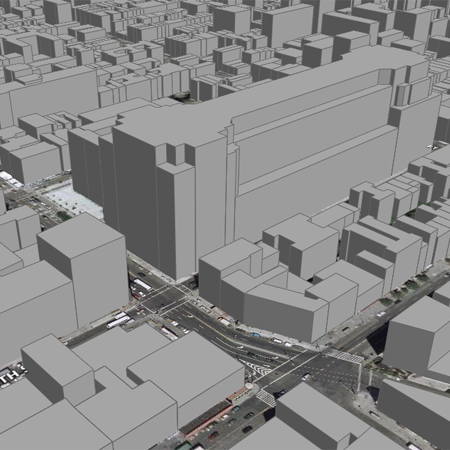
This is the first Sparknotes office. It’s the old Port Authority building between 8th and 9th Avenues and 15th and 16th Streets. In this image, we’re looking towards the southwest corner, 15th Street & 9th Avenue. It was a massive building; we were on the 8th floor which extended over most of the block. It turns out Google Earth lets you see buildings in some parts of New York, so here are some buildings. Curious that it looks like two cathedrals laid narthex to narthex. I was working in the one that pointed the wrong direction.
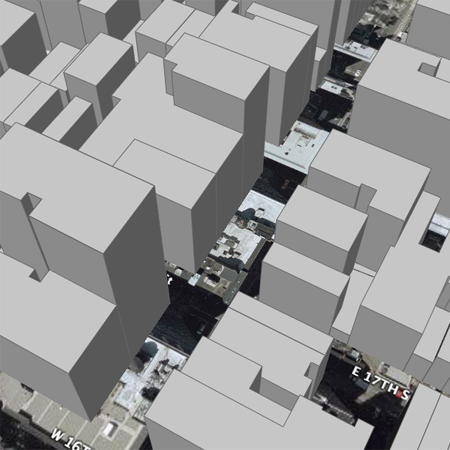
Here’s the second Sparknotes office that I worked in, at 120 5th Avenue, in a building beset by the Gap all around. The avenue seems to have the roof in it – Google hasn’t perfected everything yet.
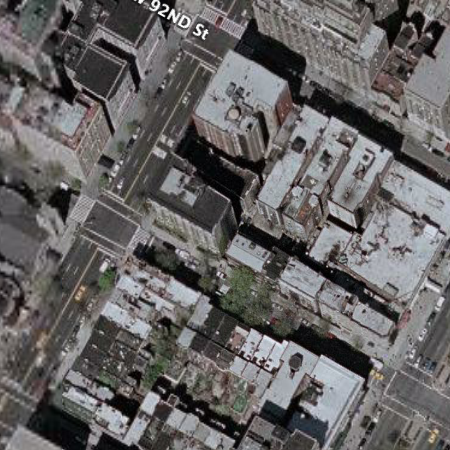
Here is the first office of the Institute for the Future of the Book, Ashton’s old apartment at 91st Street & West End Avenue. I like how West 91st Street gives the impression of being a park from above. It turns out that Google Earth has no buildings for this part of Manhattan (or, for that matter, anywhere else that I’ve worked): are only commercial buildings really buildings?
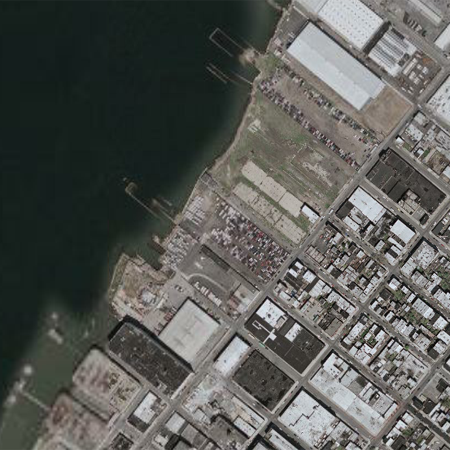
And here, zoomed out to show the river, is the current office of the Institute, on North 7th Street in Williamsburg.
New York is so gray in these maps. That wasn’t intentional.
(being where I worked in Rome)
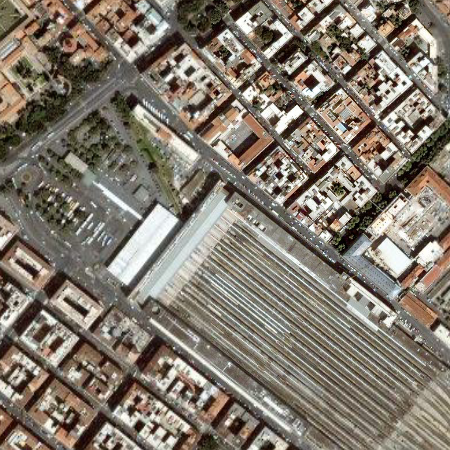
Here is the Enjoy Rome office, north of Termini on Via Marghera. There was an earlier Enjoy Rome office on Via Varese near the corner of Via Castro Pretorio which is also in this map but I didn’t work there.
(being places where I worked in Cambridge & Somerville)
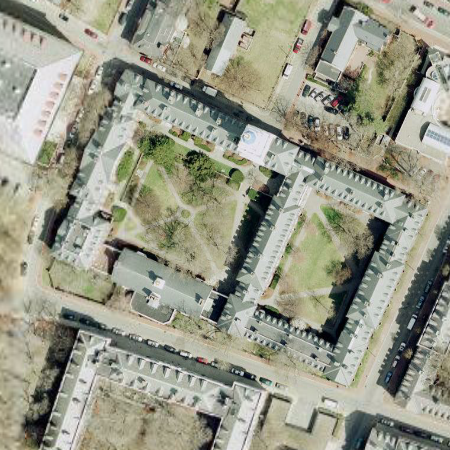
Here is Lowell House, which I cleaned as part of dorm crew. I cleaned other houses at various points, but Lowell’s the first one I cleaned, I think.
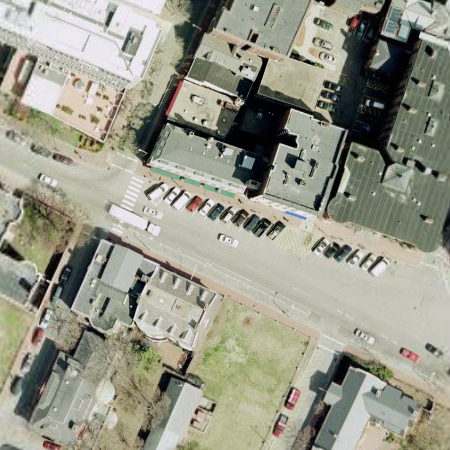
Here is the Let’s Go office (just north of Lowell House) where I worked for two summers as well as a good amount of other time during the school year. There was another summer spent working for Let’s Go in Rome, but that more properly belongs in a cartography of habitations.
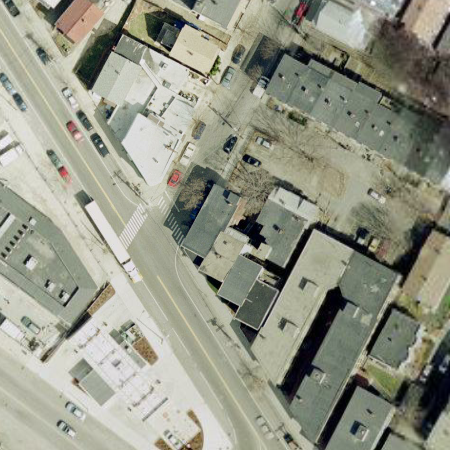
Here is the first Cognoscenti office, just north of Cambridge in Somerville. Later it moved much farther north into Winter Hill, but I don’t know precisely where that was. Here I drew maps and did other things. I later worked for Cognoscenti in Rome, but I don’t know if that counts.
(being places where I worked in Illinois)
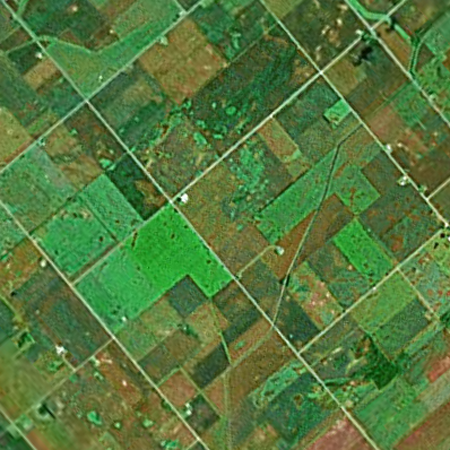
This is imprecise, because I don’t remember which cornfields I actually worked in as a detassler. But all cornfields look the same from above, which is presumably why Google doesn’t dignify them with high-resolution photos.
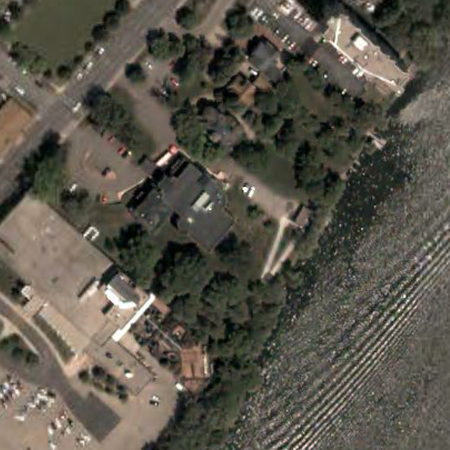
Here is the Burpee Museum of Natural History, where I was a reptile keeper and did various other things in my youth.
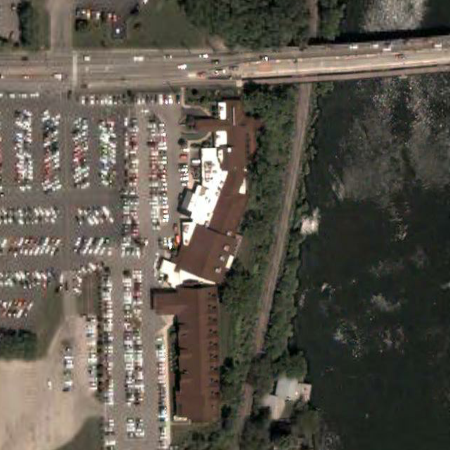
Here, farther north on the same river, is Cliffbreakers, a restaurant where I was a banquet server/busboy. It didn’t have the hotel attached to the southern end when I worked there.